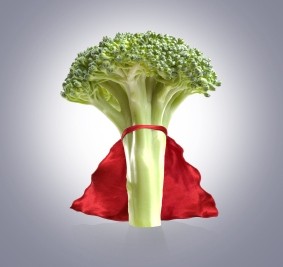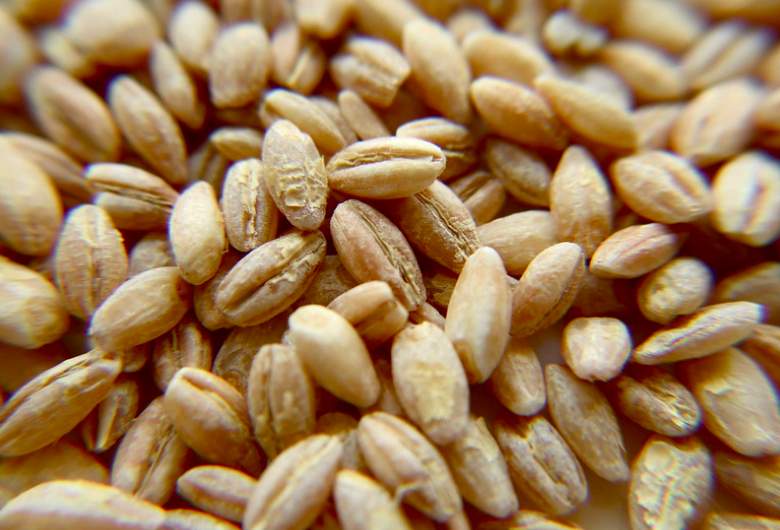Unique and proven properties of broccoli
Broccoli is sometimes called an “amazing vegetable” because of its beneficial health effects.
Broccoli is rich in fiber, vitamin C, vitamin K, iron, and potassium and contains more protein than other vegetables. This vegetable can be eaten raw or cooked, but research shows that steamed broccoli has the most health benefits.
Nutritional value of broccoli:
- Broccoli, raw – 100 g
- 34 calories
- 2.8 grams of protein
- 6/6 grams of carbohydrates
- 1.7 grams of sugar
- 2.6 grams of fiber
- 0.4 grams of fat
- 0.04 g of saturated fat
- 0.01 g of unsaturated fat
- 0.04 g of unsaturated fatty acid
- 0.02 grams of omega 3
- 0.02 grams of omega 6
- Trans fat
Broccoli is low in digestible carbohydrates but high enough to affect fiber.
Fiber stimulates the health of the abdomen and can reduce the risk of various diseases.

Vitamins and minerals of broccoli:
Vitamin C.
An important antioxidant for immune system function and skin health and eating raw broccoli (45 g) provides about 70% of the recommended daily allowance.
Vitamin K1
This vegetable contains small amounts of K1, which is essential to prevent blood clots.
folic acid
Folic acid is essential for pregnant women because it is crucial for average tissue growth and cell function.
potassium
This mineral is essential for controlling blood pressure and preventing heart disease.
Manganese
This element is found in large quantities in cereals, legumes, fruits, and vegetables.
Iron
An essential mineral has a more critical function in the body, such as transporting oxygen to red blood cells.
Carotenoids
These herbs contain lutein, capsanthin, and beta-carotene, all of which may improve eye health.
Health benefits of broccoli:
Help digest food
In an animal study, a group of mice were given broccoli as part of a natural diet and found that they could tolerate digestive problems such as colitis and perforation compared to vegetables. They concluded that this vegetable’s fiber a role. It is essential in regulating digestion and has been extinct to stay healthy and maintain healthy bacteria levels in the gut.
Prevention of chronic diseases
Broccoli sometimes contains a phenolic compound that helps keep chronic diseases at bay and is a risk factor for diabetes, asthma, heart disease, and more than deadly diseases that can lead to death.
Liver health
This herb can maintain liver function at optimal levels. Non-alcoholic fatty liver disease, which is associated with excess fat and can lead to liver cancer and cirrhosis, can prevent these problems by adding these vegetables to your diet.
It is beneficial for brain health.
This vegetable is rich in vitamin K and choline and helps develop cognition and memory; sulforaphane helps prevent Alzheimer’s and gastrointestinal diseases.
Haircare
Nutrients such as vitamin A and vitamin C in this vegetable help keep them bright, thick, and healthy. This vitamin regulates fat production in the scalp, moisturizes the hair, and thus neutralizes dry hair.
Metabolic purification
Nutrients such as fiber, vitamin C, vitamin D, vitamin K, folic acid, and vitamin A in this vegetable increase the body’s metabolism.
UV protection
Glucosamine is a nutrient found in this vegetable associated with preventing the adverse effects of sun exposure.
Treatment of abdominal disorders
This vegetable is very rich in fiber that helps treat constipation because it retains water in the body and stimulates healthy bowel movements. Magnesium and its vitamins treat acidity and facilitate proper digestion and absorption of nutrients. Gives and, by reducing inflammation, relieve gastritis.

skincare
This vegetable cares for the skin and gives you a radiant and healthy appearance because it contains beta-carotene, vitamin A, vitamin C, vitamin E, vitamin K, omega-3 fatty acids, amino acids, and folic acid.
Prevention of heart disease
Glucosamine, a large amount of fiber in this vegetable, helps lower cholesterol or harmful cholesterol levels and maintains proper heart function.
Lowering bile also has a significant effect on cholesterol levels, so it helps keep your heart healthy.
Eyecare
Carotenoids such as zeaxanthin, beta-carotene, phosphorus, and other vitamins such as mixed vitamins A, B, C, and E are very good for eye health because they protect the eye against macular degeneration and cataracts.
Strengthen the immune system
This vegetable gets its purple and green color from antioxidants such as vitamin C, beta-carotene, selenium, copper, choline, zinc, and phosphorus. These compounds are excellent for strengthening the immune system and can protect you against a variety of infections.
Improve bone and tooth health
Broccoli strengthens bones and teeth because it is rich in vitamin K, calcium, magnesium, zinc, phosphorus, and eating. It can be especially beneficial for children, the elderly, and pregnant or lactating women because they are more exposed.

Help in pregnancy
This vegetable is full of essential nutrients for pregnant women because it contains protein, calcium, vitamins, antioxidants, iron, and phosphorus. Its rich fiber also eliminates constipation, which is very common during pregnancy.
The folic acid in these vegetables ensures no congenital disabilities such as neural tube defects; this is a big problem for pregnant women deficient in folic acid in their diet.
Regulate blood pressure
Chromium is found in large amounts in this vegetable and helps the proper functioning of insulin and regulates blood sugar and its potassium by reducing stress and blood pressure, and blood vessels to increase the body’s blood flow and oxygenation. It helps regulate blood pressure and protects the body against cardiovascular diseases such as stroke or heart attack.
Treatment of anemia
Broccoli is rich in iron and protein, so it is the proper treatment for anemia. Copper is another essential mineral in the production of red blood cells along with iron.
Side effects of broccoli:
Although this unique plant has many health benefits, there is always room for caution. Common side effects include:
- Intestinal irritability
- Allergic reactions
- skin itching
dangers:
Blood-thinning: Vitamin K in this vegetable can prevent anticoagulants, so be careful if you are currently taking warfarin or any other blood type.
Hypothyroidism: If you overeat, broccoli can make your thyroid worse.
Side effects and allergies to broccoli:
Although eating this vegetable has health benefits, it also has side effects. Some people may see its adverse effects; for example, eating this vegetable is not suitable for anemia because their vitamin K intake suddenly decreases, which plays a significant role in blood clotting.

Cultivation of broccoli:
The word “broccoli” comes from an Italian word meaning sprout. This plant grew in ancient Italy and is native to the eastern Mediterranean and Asia Minor and was introduced to Britain and the United States in the 1700s. It grows in cold climates and alkaline soils.
Also Read:
23 Foods and Drinks You Should Never Eat After Exercise


